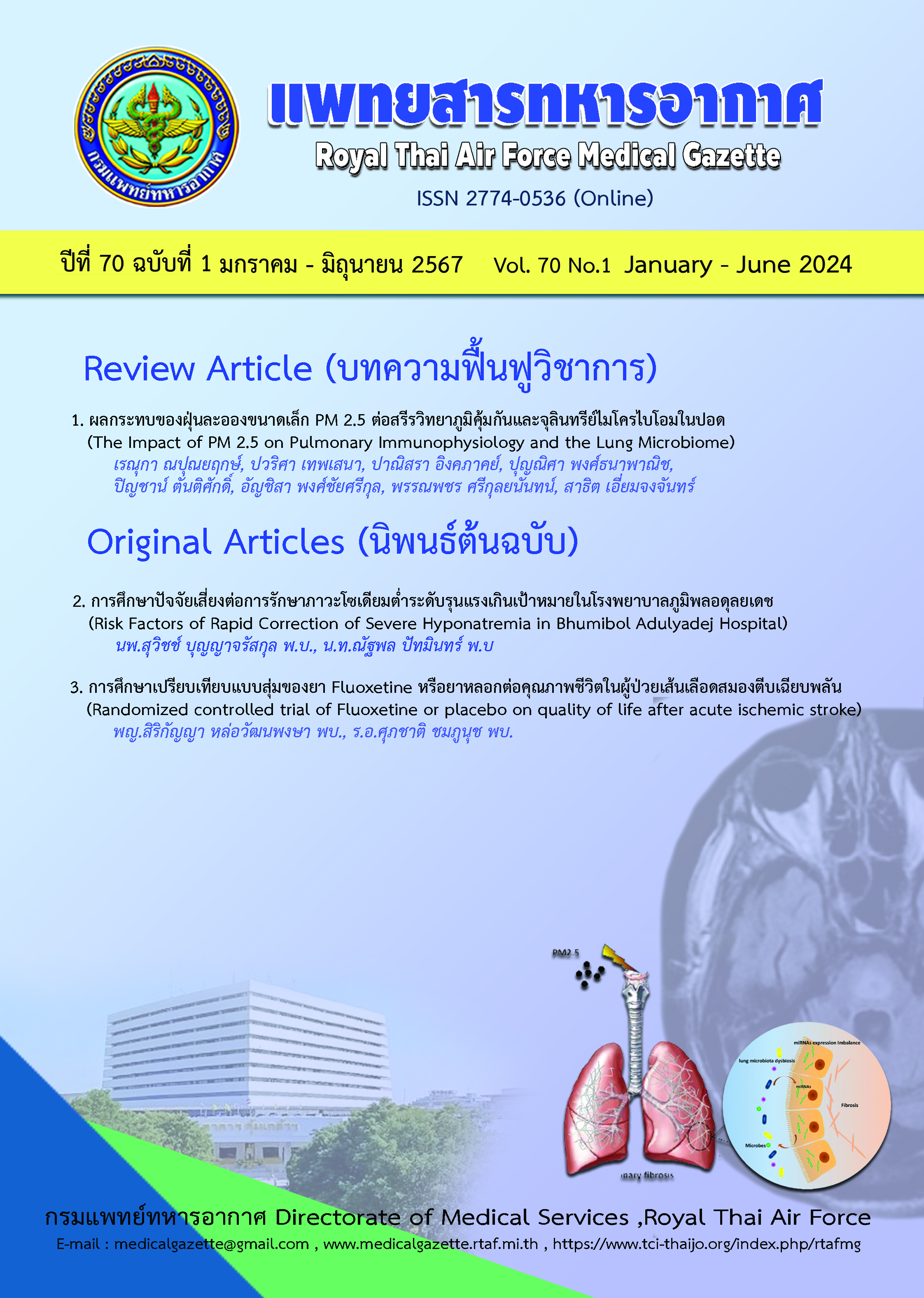Risk Factors of Rapid Correction of Severe Hyponatremia in Bhumibol Adulyadej Hospital
Main Article Content
Abstract
Background: Severe hyponatremia is a common electrolyte imbalance which can make patients develop neurological symptoms such as headache, nausea, vomiting, and coma. Treatment of severe hyponatremia need to be cautious because overcorrection may lead to serious neurological complications including osmotic demyelination syndrome (ODS). Nowadays, there are limited data on incidence and risk factors of overcorrection of severe hyponatremia.
Method: In a retrospective study of 400 patients aged 18 years and older who were hospitalized with serum sodium <120 mEq/L at Bhumibol Adulyadej Hospital from 2018 to 2021, we examined the incidence and risk factors of overcorrection. Overcorrection was defined as a serum sodium increase of ≥10 mEq/L at 24 hours and ≥18 mEq/L at 48 hours. Data on patient’s characteristics were collected and analyzed using descriptive and analytical statistics.
Result: Of all 400 patients with severe hyponatremia, 84 patients (21%) experienced overcorrection. Multivariate analysis revealed that the risk factors for overcorrection of severe hyponatremia include age younger than 65 years (odd ratio (OR) 1.99, 95% Confidence Interval (CI) 1.2-3.31, P-value 0.008), initial serum sodium lower than 115 mEq/L (OR 2.10, 95%CI 126-3.48, P-value 0.004) and hypovolemic volume status (OR 2.60, 95%CI 1.55-4.35, P-value <0.001). ODS following overcorrection was found in 4 patients accounted as 1% of population.
Conclusion: Among patients hospitalized with severe hyponatremia, overcorrection was occurred in 21%. The risk factors for overcorrection are age younger than 65 years, initial serum sodium lower than 115 mEq/L and hypovolemic volume status.
Article Details

This work is licensed under a Creative Commons Attribution-NonCommercial-NoDerivatives 4.0 International License.
บทความที่ได้รับการตีพิมพฺเป็นลิขสิทธิ์ของวารสาร
References
George J., et al. Risk factors and outcomes of rapid correction of severe hyponatremia. Clinical Journal of the American Society of Nephrology, 13: 984–992, 2018.
Adrogué H., et al. Diagnosis and Management of Hyponatremia: A Review. Journal of the American Medical Association, 328(3): 280-291, 2022.
Sahay M., et al. Hyponatremia: A practical approach. Indian Journal of Endocrinology and Metabolism, 18(6): 760-771, 2014.
Sterns R., et al. Overcorrection of hyponatremia is a medical emergency. Kidney International, 76: 587–589, 2009.
Verbalis JG, et al. Diagnosis, evaluation, and treatment of hyponatremia: Expert panel
recommendations. The American Journal of Medicine, 126: S1–S42, 2013.
Chawla A, Sterns RH, Nigwekar SU, Cappuccio JD: Mortality and serum sodium: Do patients die from or with hyponatremia? Clin J Am Soc Nephrol, 6: 960–965, 2011.
Vu T, Wong R, Hamblin PS, Zajac J, Grossmann M: Patients presenting with severe hypotonic hyponatremia: Etiological factors, assessment, and outcomes. Hosp Pract, 37: 128–136, 2009
Sterns, R., et al. Severe symptomatic hyponatremia: Treatment and outcome. Annals of Internal Medicine, 107:656-664, 1987.
Hoorn E., et al. Diagnosis and Treatment of Hyponatremia: Compilation of the Guidelines. Journal of the American Society of Nephrology, 28: 1340–1349, 2017.
Karp BI, Laureno R. Pontine and extrapontine myelinolysis: a neurologic disorder following rapid correction of hyponatremia. Medicine.72: 359-373, 1993.
Woodfine J., et al. Criteria for Hyponatremic Overcorrection: Systematic review and cohort study of emergently ill patients. J Gen Intern Med, 3 5(1):315–21, 2019.
Baek SH., et al. Risk of overcorrection in rapid intermittent bolus vs slow continuous infusion therapies of hypertonic saline or patients with symptomatic hyponatremia. Journal of the American Medical Association, E1-E12, 2020.
Woodfine J., et al. Derivation and validation of a novel risk score to predict overcorrection of severe hyponatremia: The Severe Hyponatremia Overcorrection Risk (SHOR) Score. Clinical Journal of the American Society of Nephrology, 14: 975-982, 2019


